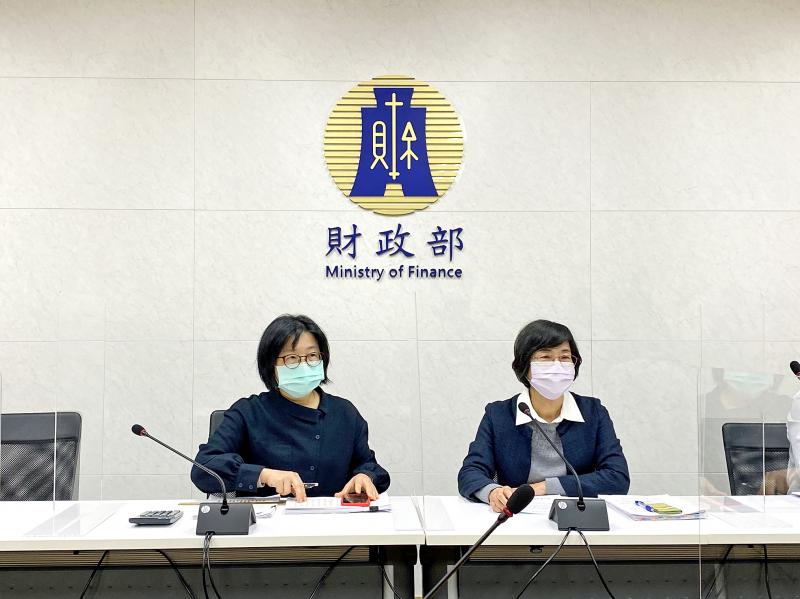The central government last month received NT$203.2 billion (US$7.29 billion) in tax revenue, an 8.4 percent rise from a year earlier to a historical high, as a healthy economy boosted personal and corporate incomes, the Ministry of Finance said yesterday.
The high draw came despite securities transaction tax revenue registering a 17.8 percent retreat year-on-year, ending 27 straight months of gains, as the specter of interest rate hikes and geopolitical tensions abroad drove investors to cut equity positions, factors that persist this month, the ministry said.
The timing of the Lunar New Year holiday had much to do with the advance in overall tax revenue, Department of Statistics Deputy Director-General Chen Yu-feng (陳玉豐) said, adding that year-end bonuses led to personal income tax revenue rising by 32 percent to NT$38.6 billion last month.

Photo: Clare Cheng, Taipei Times
Corporate tax revenue soared nearly threefold to NT$4.8 billion, partly because tax returns lowered the comparison base last year, Chen said.
Tech and non-tech firms had a profitable year, although companies reliant on domestic demand were hit hard by local COVID-19 outbreaks, government data showed.
Companies are generally positive about business this year, as the world is expected to emerge further from the COVID-19 pandemic, fueling demand for new technology products and applications.
However, securities transaction taxes, the main revenue driver in the past two years, posted the first decline in 27 months to NT$17.4 billion, as domestic and foreign players retreated to the sidelines on concerns that central banks globally are expected to raise interest rates to curb inflation, Chen said.
Uncertainty has also grown over potential military conflicts between Russia and Ukraine, she said.
Unease explained why US 10-year US Treasury yields topped 2 percent and the TAIEX yesterday tumbled below 18,000 points, Chen said, adding that things might remain fluid in the near future.
Daily stock turnover averaged NT$348.2 billion last month, down 18.78 percent from the same time last year, government data showed.
Tax revenue from land value increases amounted to NT$10.7 billion, a 1.2 percent rise from a year earlier, although the number of taxable deals dropped by 1.9 percent to 63,873, the ministry said.
The ministry yesterday also revised tax revenue surplus projections for last year that were 19.8 percent higher than budgeted to NT$432.7 billion, compared with NT$402.4 billion the ministry expected one month earlier, an 18.6 percent gain, Chen said.

Taiwan will prioritize the development of silicon photonics by taking advantage of its strength in the semiconductor industry to build another shield to protect the local economy, National Development Council (NDC) Minister Paul Liu (劉鏡清) said yesterday. Speaking at a meeting of the legislature’s Economics Committee, Liu said Taiwan already has the artificial intelligence (AI) industry as a shield, after the semiconductor industry, to safeguard the country, and is looking at new unique fields to build more economic shields. While Taiwan will further strengthen its existing shields, over the longer term, the country is determined to focus on such potential segments as

UNCERTAINTY: Innolux activated a stringent supply chain management mechanism, as it did during the COVID-19 pandemic, to ensure optimal inventory levels for customers Flat-panel display makers AUO Corp (友達) and Innolux Corp (群創) yesterday said that about 12 to 20 percent of their display business is at risk of potential US tariffs and that they would relocate production or shipment destinations to mitigate the levies’ effects. US tariffs would have a direct impact of US$200 million on AUO’s revenue, company chairman Paul Peng (彭雙浪) told reporters on the sidelines of the Touch Taiwan trade show in Taipei yesterday. That would make up about 12 percent of the company’s overall revenue. To cope with the tariff uncertainty, AUO plans to allocate its production to manufacturing facilities in

COLLABORATION: Given Taiwan’s key position in global supply chains, the US firm is discussing strategies with local partners and clients to deal with global uncertainties Advanced Micro Devices Inc (AMD) yesterday said it is meeting with local ecosystem partners, including Taiwan Semiconductor Manufacturing Co (TSMC, 台積電), to discuss strategies, including long-term manufacturing, to navigate uncertainties such as US tariffs, as Taiwan occupies an important position in global supply chains. AMD chief executive officer Lisa Su (蘇姿丰) told reporters that Taiwan is an important part of the chip designer’s ecosystem and she is discussing with partners and customers in Taiwan to forge strong collaborations on different areas during this critical period. AMD has just become the first artificial-intelligence (AI) server chip customer of TSMC to utilize its advanced

Chizuko Kimura has become the first female sushi chef in the world to win a Michelin star, fulfilling a promise she made to her dying husband to continue his legacy. The 54-year-old Japanese chef regained the Michelin star her late husband, Shunei Kimura, won three years ago for their Sushi Shunei restaurant in Paris. For Shunei Kimura, the star was a dream come true. However, the joy was short-lived. He died from cancer just three months later in June 2022. He was 65. The following year, the restaurant in the heart of Montmartre lost its star rating. Chizuko Kimura insisted that the new star is still down